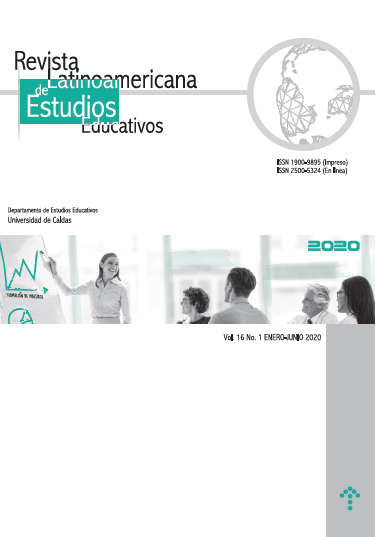Autores/as
Resumen
Esta investigación se realizó para aumentar la conciencia de los estudiantes y profesores sobre la importancia de integrar la tecnología que les permite a los estudiantes seguir aprendiendo y mejorando durante su tiempo fuera de clase. El objetivo fue determinar el efecto de integrar la plataforma virtual Memrise como herramienta de enseñanza. La metodología utilizó un método cuantitativo que apunta a comprender mejor la medición de los resultados, basada en la información obtenida de la base de datos de pre-prueba, post-prueba y Memrise. El contexto fue un programa de idiomas extranjeros en una universidad colombiana en el período 2018B para estudiantes del segundo semestre de idiomas extranjeros, integrando la plataforma virtual Memrise. La conclusión fue que el efecto de integrar la plataforma virtual Memrise como herramienta de enseñanza para el vocabulario de inglés fue efectivo, aunque esta aplicación no era interesante o fácil de usar para algunos estudiantes.
Citas
Cao Y. (2013) Cultivation of autonomous learning ability-essential requirement for college students. In: Zhong Z. (eds) Proceedings of the international conference on information engineering and applications (IEA) 2012. Lecture notes in electrical engineering. 217,11–18. https://doi.org/10.1007/978-1-4471-4850-0_2
Eldow, A., Shakir, M., Abdullah, M. Y., and Malik, S. I. (2017). Using information communication technology as a teaching tool in Sudanese Governmental Universities of Khartoum State. JOIV : International Journal on Informatics Visualization, 1(4), 150-156. https://doi.org/10.30630/joiv.1.4.55
Gafni, R., Achituv, D. B., and Rachmani, J. (2017). Learning Foreign Languages Using Mobile Applications. Journal of Information Technology Education: Research, 16, 301-317.
González, H. (2015). La integración de la tecnología como herramienta significativa en la enseñanza del inglés como lengua extranjera. Horizontes Pedagógicos. 17(1), 53-66.
González, H., Villota, J. and Medina, P. (2017). Strategies used by professors through virtual educational platforms in face-to-face classes: a view from the Chamilo platform. English language teaching, 10(8), 1-10. http://doi.org/10.5539/elt.v10n8p1
González, H., Ramírez, A. and Villota, J. (2019). Integrating technology In the improvement and motivation of learning english as a foreign language. International journal of scientific & technology research. 8(10), 32-37
Gupta, S., and Seth, A. (2014). Web 2.0 Tools in Higher Education. Trends in Information Management, 10(1), 1–11.
Gürkan, S. (2018). The Effects of a Mobile Assisted Vocabulary Learning Application on Vocabulary Learning. Turkish Online Journal of Qualitative Inquiry, 9(3), 288–311. https://doi.org/10.17569/tojqi.407512
Hernández, R. Fernández, C. and Baptista, P. (2004). Metodología de la Investigación. México: McGraw-Hill Interamericana.
Kocaman, O., Yıldız, M. and Kamaz, B. (2018). Use of Vocabulary Learning Strategies in Turkish as a Foreign Language Context. International Journal of Psychology and Educational Studies, 5(2), 54-63
Little, D. Dam, L. and Legenhausen, L. (2017). Language learner autonomy: theory, practice and research. UK : Multilingual Matters.
MacFarlane, A. (2004). Motivational Strategies in the Language Classroom (review). The Canadian Modern Language Review / La revue canadienne des langues vivantes, 61(2), 287–289. https://doi.org/10.1353/cml.2005.0007
Miraz, S. and Ali, M. (2018). Mobile Assisted Language Learning (MALL) – A Brief Survey. Annals of Emerging Technologies in Computing (AETiC), 2(2), 37-45
Mishou, M. (2017). Second language acquisition theories as reflected in Call and MALL. Scientific educational journal. 5(2),17-28.
Nasrollahi, K., and Daneshfar, S. (2018). The effect of visual contextual support and glossary of words on guessing meaning of new vocabulary items in english by pre-university male EFL students. Journal of Language Teaching and Research, 9(3), 561-572. https://doi.org/10.17507/jltr.0903.16
Oni, O., Odaro-Ekhaguebo, K., & Akpoduado, E. (2018). Assessment of information communication technology proficiency of secondary school teachers. Journal of Pedagogical Research, 2(1), 46-54.
Oxford, R. and Scarcella, R. (1994). Second language vocabulary learning among adults: State of the art in vocabulary instruction. System, 22(2), 231-243. https://doi.org/10.1016/0346-251X(94)90059-0
Radin, J. (2017). Mobile assisted language learning: advantages and use among different age groups. Scientific Bulletin of the Politehnica University of Timişoara Transactions on Modern Languages. 16(1), 79-92.
Smith, T. (2013). Qualitative and quantitative research. Research Starters: education (online edition)

 PDF
PDF
 FLIP
FLIP























